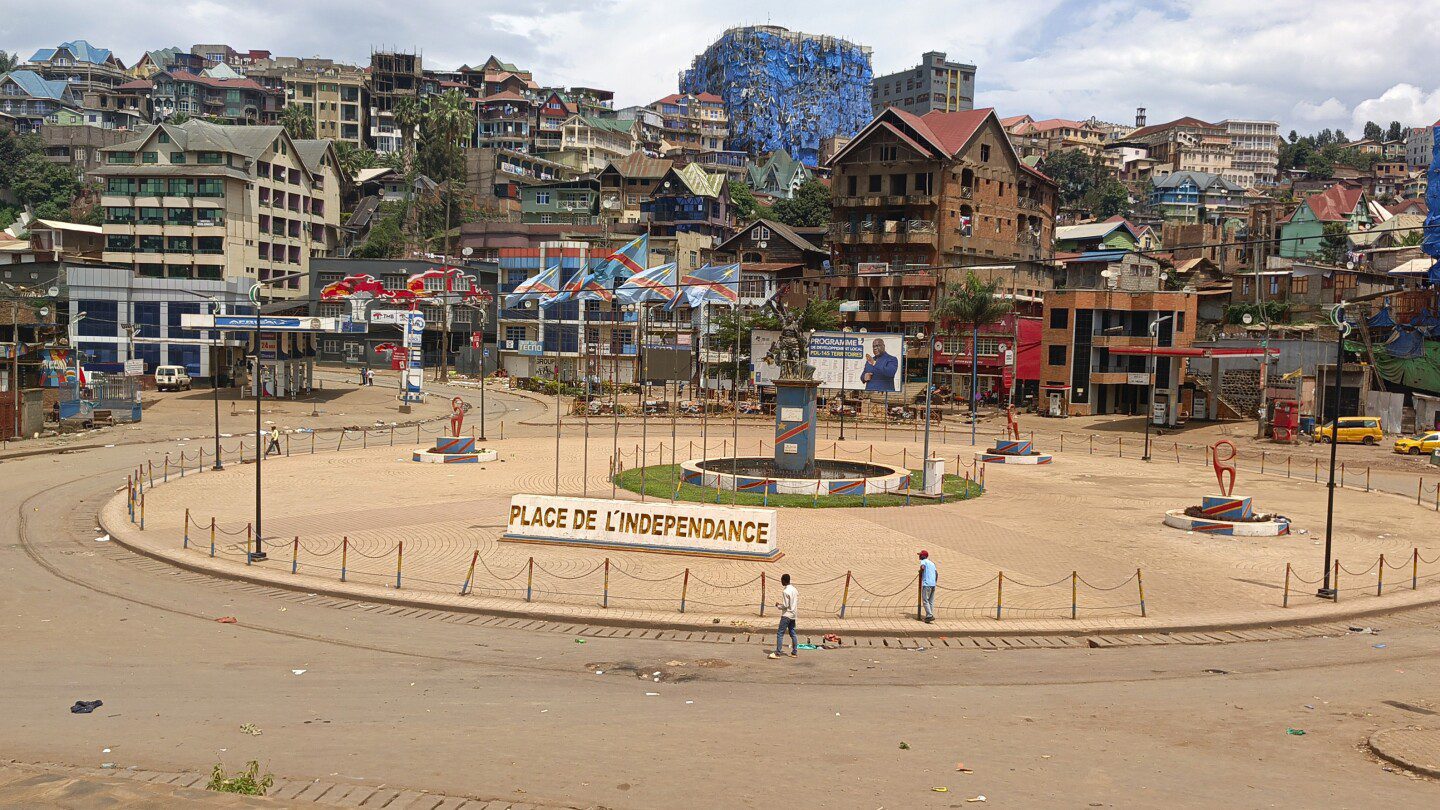
GOMA, Congo (AP) — A wave of panic engulfed eastern Congo’s second-largest city on Saturday as thousands of residents and soldiers fled, desperately seeking safety from the imminent threat posed by Rwanda-backed rebels.
The chaos unfolded the morning after M23 forces reached the outskirts of Bukavu, a city with a population of approximately 1.3 million, located 63 miles (101 kilometers) south of the rebel-controlled Goma. Streets filled with fleeing residents and looters hastily stuffing flour sacks with food supplies, creating a scene of desperation. As the day progressed, an eerie silence fell over the city as locals and business owners anxiously awaited the next developments.
Despite the turmoil, M23 did not seem to have firmly captured Bukavu. The group refrained from issuing announcements about significant territorial gains, contrasting with their prior day’s success in taking control of an airport outside the city.
A sense of relative calm returned as gunfire subsided after Congolese forces retreated southward, according to Bukavu resident Alexis Bisimwa.
“We no longer hear the sound of gunfire as we did earlier,” he remarked during a phone conversation with The Associated Press.
Residents reported finding charred corpses scattered across the streets — casualties of rampant looting following the departure of Congolese soldiers from their posts.
“They set ablaze the ammunition they couldn’t transport with them,” shared Alain Iragi, a resident who fled in search of refuge on Saturday.
Reports and social media footage highlighted looting across local factories and the release of prisoners, while electricity and communication systems remained largely functional in most areas.
“It’s an embarrassment. Some community members have become victims of stray bullets. Even soldiers that remain in the city are heavily involved in the looting,” expressed a 25-year-old who witnessed the chaos.
The Congo River Alliance, a coalition of rebel groups including M23, accused Congolese troops and their allied local militias from Burundi of triggering the unrest in Bukavu.
“We urge the residents to assert control over their city and not succumb to fear,” declared Lawrence Kanyuka, spokesperson for the alliance, in a Saturday statement.
Pierre Bahizi, the rebels’ self-declared governor of Bukavu, called for residents to stay composed and work together to restore order. “We must not abandon our power to chaos,” he asserted.
Rebels Advance South Following Goma’s Capture
M23, a rebel faction supported by approximately 4,000 troops from Rwanda, stands out amid over 100 groups vying for dominance in Congo’s resource-rich eastern region. Its recent territorial expansion represents the largest area captured by rebels thus far, posing an unprecedented challenge to the central government in Kinshasa. A successful takeover of Bukavu could invite closer scrutiny from an international community already engaged in various global conflicts. French President Emmanuel Macron on Saturday advocated for an immediate ceasefire, the withdrawal of M23 fighters, and the safe return of Congolese authorities to Bukavu.
The ongoing rebellion has resulted in nearly 3,000 fatalities in eastern Congo and left hundreds of thousands displaced. According to the U.N. and Congolese authorities, at least 350,000 internally displaced individuals are currently without proper shelter.
The M23 rebels show no indications of slowing their advance. On Friday, they claimed to have taken control of Bukavu’s serving airport, situated in a town north of the city.
The AP has yet to verify who currently controls this strategically crucial airport, which serves to resupply Congolese troops and facilitate humanitarian aid deliveries. The Congo River Alliance stated on Saturday that M23 seized the airport to hinder Congolese forces from launching airstrikes against civilians.
Government spokespersons and local community leaders have not immediately provided comments, although Congo’s Communications Ministry has reported that the rebels breached ceasefire agreements and attacked Congolese forces striving to prevent urban warfare in Bukavu.
The disorder comes on the heels of reports from residents who stated that soldiers in Kavumu, the airport town north of Bukavu, abandoned their posts to head toward the city. This pattern of retreat echoes the events leading up to M23’s earlier capture of Goma. Despite extensive resources, Congo’s military has faced persistent challenges related to training, coordination, and ongoing corruption issues.
Concerns Among African Leaders About Potential Conflict Spread
The conflict has emerged as a key discussion point at the African Union summit in Ethiopia, with U.N. Secretary-General António Guterres cautioning that it risks escalating into a broader regional conflict.
“We must avoid regional escalation at all costs,” Guterres emphasized during the summit, advocating for respect of Congo’s sovereignty and territorial integrity.
Nonetheless, African leaders and the global community have been hesitant to take strong measures against M23 or Rwanda.
While Guterres maintained that the resolution to the conflict lies within Africa, there remains a lack of consensus among African leaders on a mutually satisfactory solution for the various parties involved.
Widespread calls for a ceasefire have grown louder, as the rebellion exacerbates long-standing tensions in the Great Lakes region. Troops from Burundi and the Southern African Development Community are providing support to Congolese forces, while Ugandan troops are engaged in battles against other rebel factions in eastern Congo, where assaults on civilians have surged in recent months.
In Ituri, located hundreds of kilometers north of M23’s current advance, Ugandan troops are actively searching for members of the Islamist group, Allied Democratic Forces.
The potential for heightened conflict loomed large on Saturday, as Uganda’s military leader, Muhoozi Kainerugaba, issued an ultimatum to armed forces within the province’s capital, giving them 24 hours to surrender and warning that it would soon come under Ugandan Army control.
“Failure to comply will result in them being regarded as enemies, and we will take action,” Kainerugaba stated in a post on X, without specifying which forces were being targeted.
___
Reporting contributed by Sam Metz from Rabat, Morocco, and Rodney Muhumuza from Kampala, Uganda.









